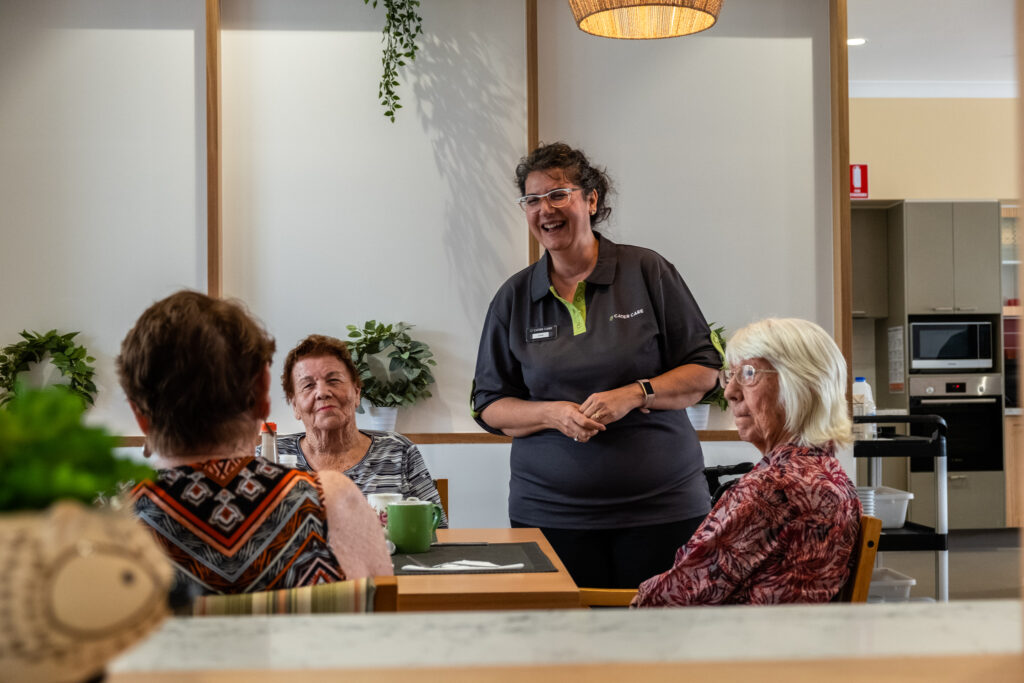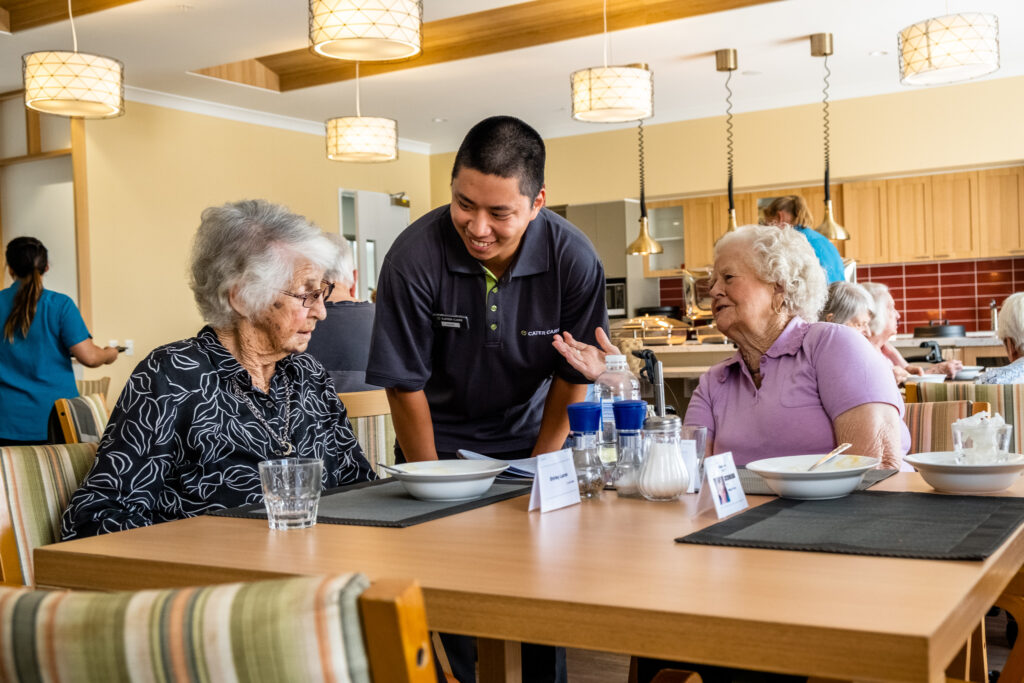As 2023’s Dementia Action Week continues, we’d like to take this opportunity to continue to raise awareness of how various aspects of the disease. It’s easy to think of dementia in the purely publicised and stereotypical terms such as memory loss, personality shifts, and rapid mood swings, but the effects of the condition extend much further than just immediate mental effects. No area of life is left untouched by dementia’s effects, and a resident’s food intake and dietary habits are often one of the first things to be seriously impacted as the condition progresses. It’s the responsibility of aged care providers and their aged care catering solutions to recognise the potential impact on residents’ dietary intakes and to take steps to ensure the residents can continue to lead a healthy and fulfilling life.

Disrupting the routine
Diet and eating issues typically manifest in residents with dementia as a result of cognitive decline that significantly impairs their memory, critical thinking, planning ability, and judgement skills. As their ability to maintain a routine by themselves begins to fail, dietary habits begin to deteriorate. Residents suffering from dementia may suffer from a partial or complete loss of appetite, caused by factors such as a decreased sense of smell or taste, not recognising food or utensils, or a resident’s entire set of culinary preferences changing or being lost as a result of cognitive decline. 1 Other residents may experience a greatly increased appetite resulting in an insatiable hunger, possibly as a result of forgetting that they’ve recently eaten, eating more out of fear that their next meal may not be forthcoming, or radically changing food preferences resulting in them becoming obsessed with specific foods or meals.2

The professional perspective
When tackling the dietary issues a resident with dementia is likely to experience, it’s important to bear in mind that no two experiences of dementia are the same. Any strategies developed need to be built around the individual, and a facility’s aged care food services need the training, resources, and experience to carry out resident-specific care. Despite this need for a tailored approach, there are some broader-scope recommendations that can be made that will generally improve the dining experience for residents suffering from dementia.
Due to the advanced age that dementia frequently presents itself in, it’s an unfortunate reality that dementia is unlikely to be the only condition that residents are experiencing. A lack of appetite may be exacerbated by failing dental health or dysphagia. Addressing pre-existing health concerns is crucial to appropriately managing the impacts of dementia on the diet. Additionally, as dementia erodes our perception of smell and taste, sensory stimulation becomes more important than ever for a positive mealtime; meals being prepared nearby where residents can hear and smell them being cooked can play a vital role in stimulating appetite, and stronger sensory inputs may positively impact on the formulation of memories. 3
Maintaining order
In addition to the broader scope of professional advice and individual tailored strategies, there are a few specific pieces of practical advice that carers and caterers can employ in order to manage the eating challenges associated with residents suffering from dementia.
Making it appealing
For residents suffering from a severe lack of appetite, establishing a routine that provides meals at regular times each and every day may help to re-establish a time-based sense of appetite. It may prove helpful to serve already familiar foods that are especially seasoned and flavourful to excite a limited sense of smell and taste, while providing high-calorie meal components such as yoghurt or ice-cream to make the most of their appetite while it lasts. Food should also be readily available outside of these set meal times in the event that the resident experiences a sudden onset of hunger. In general, mealtimes should be simple, relaxed, and low-pressure affairs to avoid overwhelming or stressing the resident and putting them off their food. 4


Satiating the hunger
Managing residents with dementia experiencing insatiable hunger can prove somewhat more complicated, but there are still steps that can be taken to reduce the severity of these issues. If the hunger is persistent, aged care catering staff may wish to consider providing five to six smaller, lower calorie meals each day to meet the constant need for food, while providing low calorie snacks such as fruit and vegetables between meals. Dementia sufferers may also mistake thirst for hunger, and taking care to provide sufficient intake of water and other low-kilojoule drinks may go some distance towards meeting the need for food. 5
Conclusion
While dementia can be a challenging condition to live with, it by no means should define a person’s identity and life experience. Each person has a unique journey that deserves compassionate, tailored care, whether that comes in the form of IDDSI compliant foods, or smaller, more regular meals delivered in curated dining experiences. As we observe 2023’s Dementia Action Week, let’s commit to making every meal a moment of nourishment and comfort for aged care residents across Australia.
Here at Cater Care, we’re dedicated to enhancing the dining experience for all aged care residents, including those with dementia. Appropriate training for carers and aged care catering providers can alleviate the worst of the disruptions these residents experience, and Cater Care remains wholly committed to delivering a positive and nourishing experience for all the residents we care for. Reach out to Jonathan, our Aged Care expert, for more insight and support for caring for residents with dementia.
Jonathan Storer
Client Development Manager – Cater Care
Ph: 0424 190 566
jonathan.storer@catercare.com.au
_______________________
Reference
1 Better Health Channel . 2012. “Dementia – Eating.” Better Health. Victorian Department of Health . 2012. https://www.betterhealth.vic.gov.au/health/ConditionsAndTreatments/dementia-eating. 2 Dementia Australia. 2014. “Understanding Changes in Behaviour .” Dementia.org.au. Dementia Australia . August 4, 2014. https://www.dementia.org.au/about-dementia-and-memory-loss/about-dementia/behaviour/behaviour-changes.3 D’Andrea, Federica. “Material objects and olfactory stimuli: developing a multi-sensory stimulation intervention for people with dementia living in care homes.” PhD diss., University of West London, 2022.4 Better Health Channel . 2012. “Dementia – Eating.” Better Health. Victorian Department of Health . 2012. https://www.betterhealth.vic.gov.au/health/ConditionsAndTreatments/dementia-eating.5 Dementia Australia . n.d. “Eating Changes.” Www.dementia.org.au. Dementia Australia . Accessed August 30, 2023. https://www.dementia.org.au/information/about-you/i-am-a-carer-family-member-or-friend/personal-care/eating.